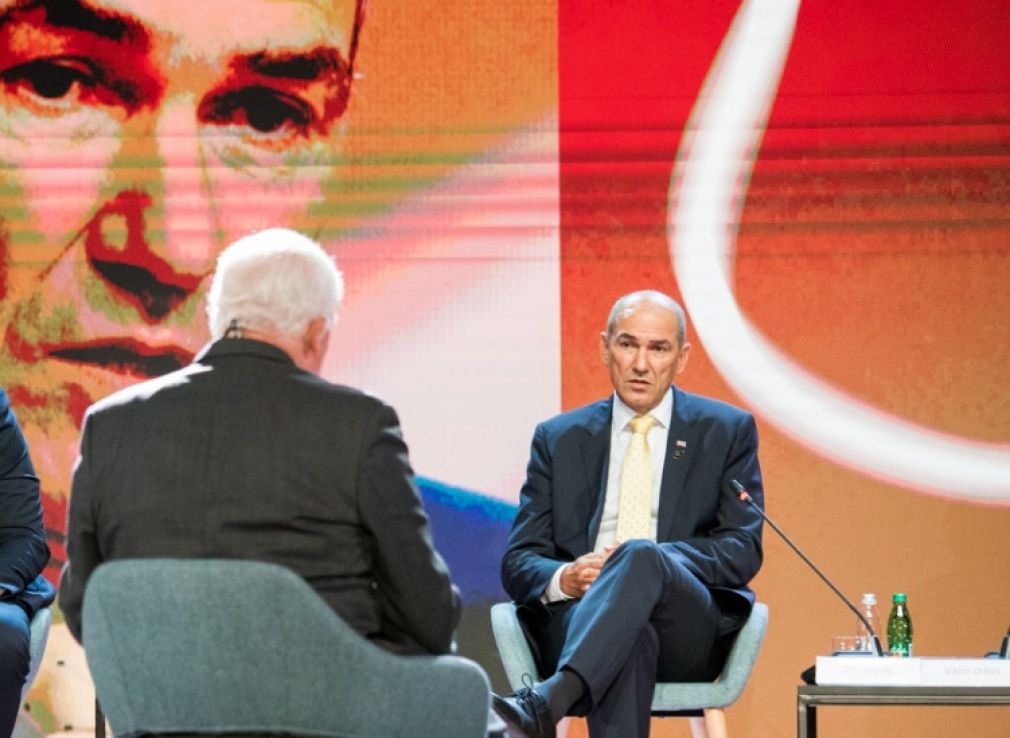Participants of the introductory panel of leaders at the Bled Strategic Forum agreed that Europe needs more joint actions in preparation for the intensification of the COVID-19 pandemic. “Winter is coming”, warned Slovenian host, prime minister Janez Janša while new EU members offered their solutions to future crisis.
The introductory panel – attended by Prime Minister of Hungary, Prime Minister of Croatia, Prime Minister of the Czech Republic, Prime Minister of Poland, Prime Minister of Bulgaria, and President of Serbia – was dedicated to the debate on the future of Europe following the COVID-19 pandemic.
In his introductory video address, President of the International Olympic Committee, Thomas Bach, emphasised the importance of sport in the post-pandemic recovery. “I hope we have already learned something during this crisis, particularly that we need more solidarity in and between societies,” he said. He stressed that in these uncertain times, the Olympic values of solidarity, excellence, respect and friendship can serve as a good guide.
International Monetary Fund Director Kristalina Georgieva expressed optimism in overcoming the COVID-19 pandemic. Although as many as 170 countries around the world will end this year poorer than they had started it, the response to the pandemic has been very decisive, “phenomenal”. She stressed that large financial incentives have so far prevented a plethora of bankruptcies. However, investment in digitalisation and education in particular must be increased to prepare the world for the new crises, especially the climate crisis that is rapidly approaching. At the same time, it is crucial to pay attention to justice, otherwise protests will emerge, Georgieva warned.
Italian Prime Minister, Giuseppe Conte – who like Georgieva, took part in the debate via video chat – emphasised that solidarity and the cohesion of the EU are much better responses to the crisis than nationalist stances. “The crisis is a unique opportunity for a stronger and more cohesive EU,” he stressed, while pointing out that a strong political vision is needed to deal with the upcoming crises. He emphasised the importance of discussions on the future of Europe, which he added, should focus on policies that meet people’s needs and strengthen the Union’s role in providing solutions.
Croatian Prime Minister Andrej Plenković called for a balance between national and joint measures in the fight against the COVID-19 crisis. The coming colder months will disclose where the crisis is headed next. However, Plenković suggested that it is already clear joint action at the European level is necessary.
Bulgarian Prime Minister, Boyko Borisov, proposed a “health shield” – a set of common protocols, which ensure similarity of measures implemented across the EU.
Leaders also stressed the importance of a joint agreement on the creation of a € 750 billion pandemic recovery fund, approved by the EU summit in mid-July. However, conditionality of drawing joint funds with respect for the rule of law portrayed disagreements among member states – Hungary and Poland with the support of Slovenia are against such clause.
Hungarian Prime Minister, Viktor Orban, rejected critiques on the state of democracy in Hungary. He asserted that democracy in Hungary is of the same quality as in Italy or Germany and meets all European standards in this area. Orban added that in Hungary, they are fighting for intellectual sovereignty, as the Christian-conservative perception of democracy differs from the liberal one. With regards to the future of Europe post COVID-19 pandemic, Orban emphasised the need for the EU to become more competitive. He noted that Europe’s security infrastructure cannot become comprehensive without European enlargement, which includes Serbia’s full membership in the EU.
Polish Prime Minister, Mateusz Morawiecki, argued that it is crucial to focus on specific issues instead of on the critiques of the Central European countries regarding their democratic standards.
He continued to say that the countries of Central Europe are being criticised for growing and becoming increasingly competitive with other countries. “However, competitiveness within the EU is good because it makes the whole EU more competitive,” he stressed. He added that the freedom to provide services across the EU must be completed in order to make Eastern European countries more competitive.
Slovenian Prime Minister Janez Janša pointed out that double standards present one of the main issues when it comes to questions regarding the rule of law. Elections were stolen in Slovenia in 2014, he was a political prisoner himself, yet no one protested because of that, he said. He also wondered what the “general public” is; according to Janša, the voters are important, not the opinion of the media.
Czech Prime Minister, Andrej Babis, was critical of the British panel moderator Nik Gowing, saying he had been told the panel would talk about the world following the COVID-19 pandemic, not the Visegrad Group and the rule of law in the EU. “Don’t read fake news,” he warned from the stage.
Serbian President Aleksandar Vucic, meanwhile, emphasized that Serbia wants to become a member of the EU, as it is better to be a member of the club than not. “We receive a lot of support from the EU, but we have our own opinion; we see what is happening in the EU, and what is happening between the EU and the US,” he said. Serbia desires a geopolitical approach from the European Union. “We need Europe in terms of values, an independent judiciary, but also a better life for our citizens, which must be respected,” he added. He noted double standards in dealing with Serbia, such as the invasion into the Serbian parliament and the attempted break-in into the German parliament on Saturday.
C. Š.

